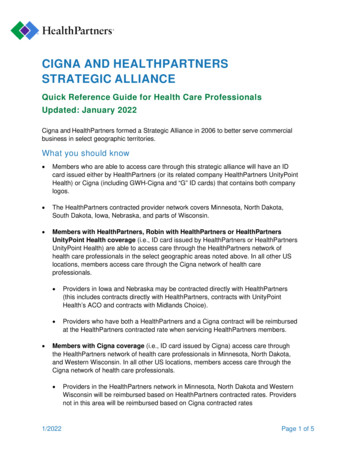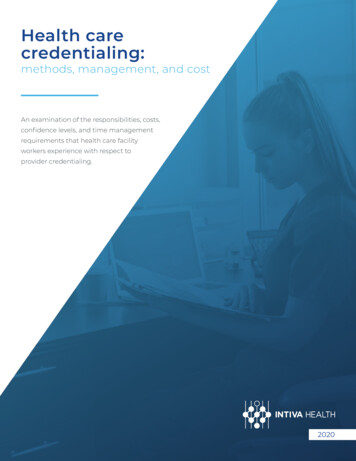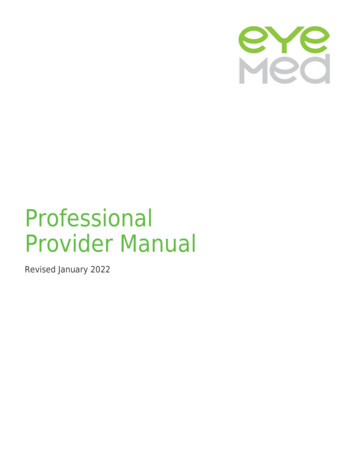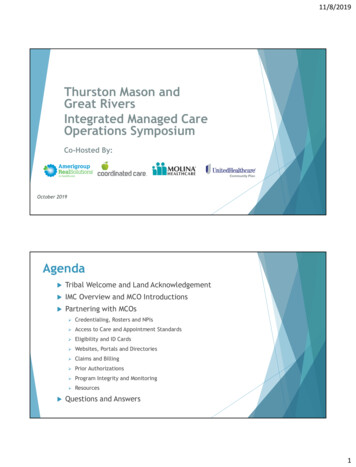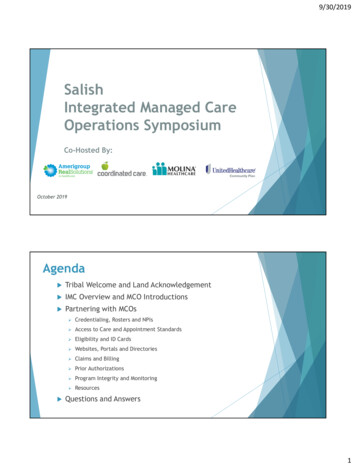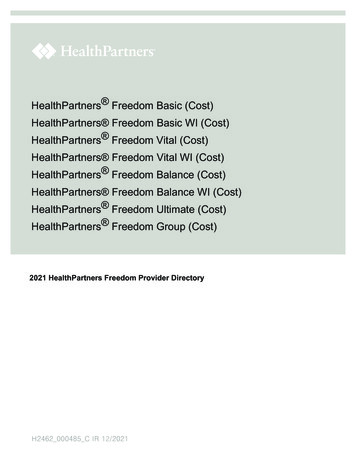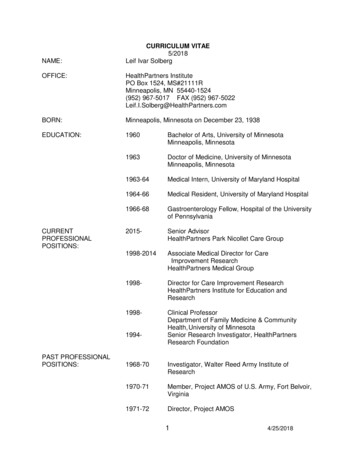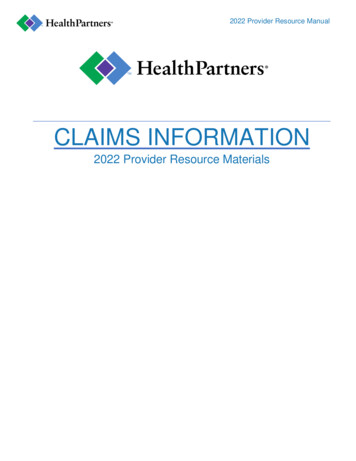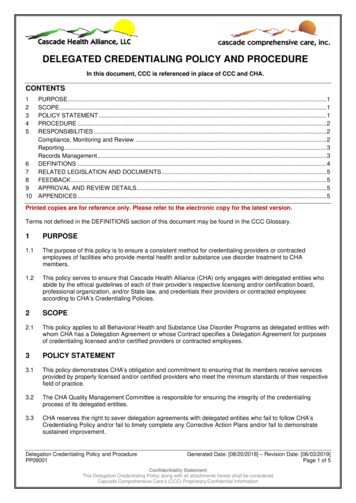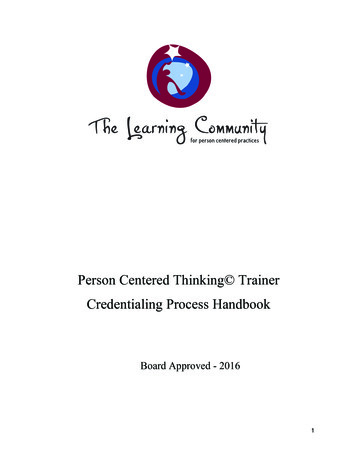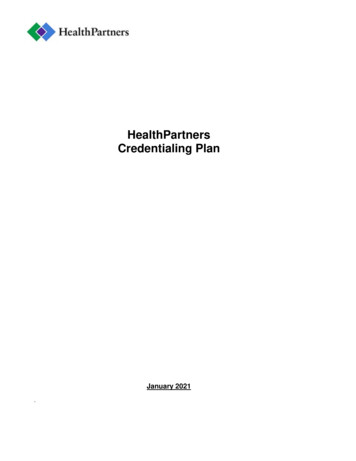
Transcription
HealthPartnersCredentialing PlanJanuary 2021.
CREDENTIALING PLANTable of ContentsINTRODUCTION . 1PURPOSE . 1AUTHORITY. 1Credentialing . Error! Bookmark not defined.Immediate Restriction, Suspension or Termination . 3Delegated Credentialing . 3SCOPE OF PLAN. Error! Bookmark not defined.CREDENTIALING PROCESS . 4Initial Credentialing, Recredentialing and Special Review . 4Termination of Practitioners . 5Reporting Obligation. 5APPEALS. 5Right to Appeal. 5Reconsideration Process. 6Hearing Process . 6APPENDIX AProfessional Criteria for AcceptanceAPPENDIX BDelegatesDelegated Activities
INTRODUCTIONHealthPartners is committed to providing its members with high quality health care. This commitment isachieved in part by establishing and maintaining a credentialing system to assure the selection andmaintenance of a network of highly qualified and competent professionals. Such a system includesdeveloping specific, objective criteria intended to reflect professional competency and ascertainingwhether or not individual health care professionals meet the criteria.Credentials, as referred to in this document, are records of an individual’s education, training,certifications, licensures, experience, and other professional qualifications. Credentialing is defined as theprocess of collection, verification, review and evaluation of an individual’s credentials.This Credentialing Plan will be reviewed at least annually by the HealthPartners Credentials Committee,the HealthPartners Chief Medical Officer and the Quality Review Committee. On an annual basis theCredentialing Plan shall be reviewed and approved by the HealthPartners Board of Directors or adesignated Board committee.The credentialing system incorporates three functions. Initial credentialing involves the evaluation of anindividual’s application for participation as a HealthPartners practitioner. Recredentialing assessespractitioners’ qualifications for continued participation with HealthPartners. On-going monitoring includesthe continuous monitoring of license actions, Medicare/Medicaid exclusions, as well as member complaintinformation.PURPOSEThe purpose of the Credentialing Program is to support a systematic approach to credentialing withinHealthPartners. A Credentialing Program includes having in place a written Credentialing Plan,documenting compliance with the Plan, assigning specific credentialing responsibilities to administrativeand professional staff, and establishing a mechanism for the periodic review and revision of the Plan. Thepurpose of the Credentialing Plan is to provide general guidance for the decision-making surroundingacceptance or continued participation of professional staff who are initially seeking association withHealthPartners, who are seeking approval of on-going association, or for whom there is reason to conducta special review. Specific objectives of the Plan include: Setting forth the minimum requirements that must be met for participation as a HealthPartnerspractitioner and, for those individuals meeting the minimum requirements, the criteria to be usedin assessing the qualifications of applicants seeking initial or on-going association withHealthPartners; Establishing the processes for verification and evaluation of a practitioner’s credentials; Establishing the processes for action if a practitioner’s credentials do not meet the establishedcriteria.Unless there are clear and convincing reasons to depart from these guidelines, HealthPartners’Credentials Committee, Quality Review Committee and staff are expected to adhere to these guidelines.Nothing contained in the Credentialing Plan shall limit HealthPartners’ discretion in accepting, restricting,disciplining, or terminating a practitioner’s association with HealthPartners. The Plan may be changed atany time at HealthPartners’ sole discretion. Such changes shall be effective on the date of the change fornew applicants and existing practitioners.AUTHORITYHealthPartners’ Board of Directors has final authority and responsibility for the adoption of a CredentialingPlan. On an annual basis the Board shall review and approve the Plan. The Board delegates itsresponsibility for oversight and administration of the Credentialing Plan to the HealthPartners ChiefMedical Officer. In addition to the Credentialing Plan, credentialing staff has in place written policies and1
procedures that support implementation of the Credentialing Program. Such policies and procedures arereviewed and approved by the HealthPartners Credentials Committee and Quality Review Committee.SCOPE OF PLANThe terms of this Credentialing Plan apply to all individuals who are applying for initial or on-goingparticipation as HealthPartners health plan practitioners. This includes practitioners who either are partiesto a HealthPartners Provider contract or are employed by a party with whom HealthPartners has aProvider contract.The Credentialing Plan covers the following practitioner types:Allied health professionals, which include nurse midwives, traditional midwives, nursepractitioners, chiropractors, optometrists, physician assistants, psychologists, licensed marriageand family therapists, chemical dependency counselors, licensed independent clinical socialworkers, licensed professional counselors, board certified behavioral analysts (in states in whichBCBA’s are licensed), clinical nurse specialists, and medication therapy management (MTM)pharmacists.Dental practitioners, which include all dentists in a general or specialty practice, dentaltherapists, and advanced dental therapists.Primary care practitioners, which include licensed physicians who practice in one of thefollowing medical specialties: family practice, general internal medicine, or pediatrics.Specialty care practitioners, which include licensed physicians whose practices include but arenot limited to one of the following medical or surgical specialties: anesthesiology (pain medicine),subspecialty internal medicine, general or subspecialty surgery, allergy and immunology,dermatology, obstetrics and gynecology, ophthalmology, orthopedics, otolaryngology, podiatry,psychiatry and neurology.Exceptions to the credentialing process are allowed for practitioners in the following four categories:1Practitioners who practice exclusively within an inpatient setting and who provide care ortreatment to HealthPartners members only because members receive services from such ahospital, or other inpatient setting. This exception shall be limited to practitioners with a specialtytype of: anesthesiology, critical care medicine, hospitalist, emergency medicine, inpatient mentalhealth, neonatology, pathology, and radiology.This exception does not apply to practitioners who are being hired by or who are currentlyemployed by one of HealthPartners related entities and fall under one of the categories above. Allsuch practitioners fall under the scope of the Plan and will be subject to the credentialing process.2. Practitioners who are not participants in the HealthPartners network to whom limited referrals maybe made on a case-by-case basis by participating practitioners or HealthPartners. Such referralsare considered to be out-of-network.3. Practitioners with whom HealthPartners contracts solely pursuant to its obligation as anadministrative services organization (“ASO”) to a health plan not underwritten by HealthPartners,unless HealthPartners expressly assumes credentialing obligations on behalf of such plan.4. Locum Tenens practitioners, i.e., practitioners who are filling in temporarily. This exceptionapplies only to locum tenens practitioners who are covering on a short-term basis in an urgentsituation (e.g. covering for a practitioner who has an unexpected family or medical leave). Locumtenens status is limited to a cumulative lifetime total of three months’ work anywhere in theHealthPartners network. In connection with a state or national emergency, the limit on locumtenens status may be extended to a cumulative lifetime total of six months, if determined2
necessary by the chair or vice-chair of the Quality Review Committee. Practitioners who haveexhausted their locum tenens eligibility may not practice in the HealthPartners network (other thanin the situations described in number 1 above) without first being credentialed. Verification of avalid license in each state where the practitioner will see HealthPartners members and a check forexclusions from state and federal programs will be completed prior to the practitioner seeingHealthPartners members.Practitioners identified in any of the above categories are beyond the scope of the Credentialing Plan.CredentialingTo assist with the administration of the processes set forth in the Credentialing Plan a multidisciplinaryCredentials Committee has been established by the HealthPartners Chief Medical Officer. The committeeis responsible for assuring that each practitioner granted association with HealthPartners possesses thequalifications necessary to deliver quality care to members. The Credentials Committee reports to theQuality Review Committee and any recommendations for denial, termination, or restriction of apractitioner’s participation are forwarded to the Quality Review Committee for decision.The composition, frequency of meetings, membership, and responsibilities of the committees are asfollows: Credentials Committee: This committee is composed of no fewer than eight (8) voting memberswho can adequately represent the health care specialties to be reviewed. Alternate committeemembers may be utilized when an active committee member is unable to attend a committeemeeting. Alternates are identified and appointed by the HealthPartners Chief Medical Officer. Thecommittee shall meet on a monthly basis. The committee’s chair and membership shall beappointed by the HealthPartners’ Chief Medical Officer. The Credentials Committee isresponsible for the review and evaluation of the credentials of individuals applying for new or ongoing participation as HealthPartners practitioners and at any time that concerns arise regardingan individual participating practitioner’s credentials and/or practice. [See also: Policy CR 2Credentials Committee Selection and Policy CR 13 Credentialing Decisions.] Quality Review Committee: This committee reports to the HealthPartners Quality Council. TheHealthPartners Chief Medical Officer is responsible for chairing the Quality Review Committee(QRC) and appointing its members. Members consist of health plan associate medical directorsand a community physician. The QRC is responsible for providing direction to the health plan’scredentialing and peer review processes; for ensuring health plan practitioners and providers arequalified to provide high quality care to health plan members; and for ensuring the credentialingand quality improvement programs comply with accreditation and state and federal regulatoryrequirements.These committees are responsible for the credentialing and recredentialing of dental, primary care,specialty care and allied health practitioners.Immediate Restriction, Suspension or TerminationThe HealthPartners Chief Medical Officer or his/her designee has the authority to immediately restrict,suspend or terminate the participation status of a practitioner to prevent the threat of imminent danger tothe health of any individual. Such immediate restriction, suspension or termination shall not initiallyexceed fourteen days pending the outcome of an investigation to determine the need for a professionalreview action. The HealthPartners Chief Medical Officer shall make a good faith effort to consult with theCredentials Committee Chair and/or select HealthPartners Quality Review Committee representativesprior to taking such action. Any immediate restriction, suspension, or termination exceeding fourteen daysrequires notice to the affected practitioner of the appeals process and right to a hearing. [See also: PolicyCR 16 Ongoing Monitoring.]Delegated CredentialingThe HealthPartners Quality Review Committee may authorize delegated credentialing responsibility andauthority to designated group practices or entities where the following conditions are met:3
1. The group practice or entity agrees to provide to HealthPartners for review a copy of itsCredentialing Plan and/or policies, including documentation of the professional criteria to beevaluated in the credentialing processes and mechanisms for their verification and review. Thecriteria and processes must be deemed substantially equivalent to those established byHealthPartners.2. There is a written agreement that states the scope of delegated activities and delegate’saccountabilities to HealthPartners.3. The group practice or entity agrees to provide HealthPartners with any modifications to itsCredentialing Plan and/or policies.4. The group practice or entity agrees to cooperate with HealthPartners’ examination of the Group’scredentialing and recredentialing processes at least annually.5. The group practice or entity agrees to provide HealthPartners with timely updates concerningadditions, changes and terminations of its practitioners.A list of group practices and other organizations or entities to which credentialing responsibility andauthority have been delegated is maintained by HealthPartners’ credentialing staff. Attached to this Plan isAppendix 2, which is a current list of delegates. [See also: Policy CR 9 Delegation of Credentialing orRecredentialing Activities Health Care Organizations.]CREDENTIALING PROCESSInitial Credentialing, Recredentialing and Special ReviewInitial credentialing is performed on all practitioners (except those specifically excluded under Scope ofPlan) who are beginning a relationship with HealthPartners and who meet the minimum requirements toapply for participation with HealthPartners as outlined in Appendix A. [See also: Policy CR 1 CredentialingInformation Collections, and Verification for Initial Credentialing.]Recredentialing of practitioners is completed at least every thirty-six (36) months. Recredentialing mayoccur more often if the Quality Review Committee, Credentials Committee, or Credentialing ServicesBureau determines that more frequent recredentialing is appropriate. The specific criteria established foreach type of practitioner are included in Appendix A. [See also: CR 10 Recredentialing InformationCollection and Verification.]Currently credentialed practitioners who are not due for recredentialing will be subject to special reviewwhen the Credentialing Services Bureau becomes aware of licensing or other disciplinary actions, mediaor other reports concerning unethical or criminal behavior, investigations by the HealthPartners SpecialInvestigations Unit related to findings of fraud, waste and abuse, member complaints leading to a findingof concerns about quality of care, or any other information that indicates the practitioner may not be ableto provide safe and appropriate care to HealthPartners members. Once necessary information has beengathered, special review will occur at the next meeting of the Credentials Committee.The Credentials Committee or medical director may accept the initial and recredentialing applications ofpractitioners who meet all established criteria as defined in HealthPartners credentialing policies andprocedures. Credentials Committee review and discussion is required for any practitioners who have anidentified variance from established criteria or who are subject to special review. Recommendations bythe Credentials Committee to deny, restrict, or terminate participation are communicated in writing to theHealthPartners Quality Review Committee, which votes to accept or reject the recommendation of theCredentials Committee. [See also: Policy CR 13 Credentials Committee Decisions.]The Quality Review Committee makes the final decision regarding denial, termination, or restriction of apractitioner’s or provider’s participation in the HealthPartners network based on the recommendations ofthe HealthPartners Credentials Committee or its own evaluation of information from other sources.4
All credentialing decisions will be based on HealthPartners professional criteria for acceptance.HealthPartners does not make credentialing decisions based on an applicant’s race, ethnic/nationalidentity, gender, age, sexual orientation, the types of procedures a practitioner performs, or the types ofpatients a practitioner sees.ConfidentialityNon-public information collected during the credentialing process is considered confidential. Access tocredentialing information is limited to authorized individuals and is accessible to the applicant except forthe information protected by Minn. Stat. §§ 145.61–145.67. Individual practitioner credentialing files arekept in a secure location within the HealthPartners Credentialing Services Bureau.Termination of PractitionersThe Quality Review Committee (QRC) may decide to deny or terminate the participation status of anypractitioner. The QRC may rely upon any of the following as a basis for denial or termination.1. A determination, based upon failure to meet one or more of the HealthPartners ProfessionalCriteria for Acceptance or any other information available to the QRC, that the practitioner has notadequately demonstrated that he or she would provide safe, high-quality care to allHealthPartners members.2. The practitioner has engaged in uncooperative, unprofessional, or abusive behavior towards oneor more HealthPartners members, HealthPartners employees, or members of the CredentialsCommittee, Quality Review Committee, or Board of Directors.Termination by HealthPartners Credentialing StaffHealthPartners Credentialing staff may terminate the credentialing process for a practitioner who has notreturned required credentialing information that is necessary to process their application for participation.Credentialing staff may administratively terminate a practitioner who has not returned requiredrecredentialing information that is necessary to process their application for continued participation orinformation that is required for special review. Credentialing staff may also administratively terminate apractitioner if a clinic with which the practitioner is associated has placed the practitioner on a leave ofabsence that exceeds 12 months.Credentialing staff shall immediately terminate a practitioner upon notice that the practitioner’s license hasbeen revoked or suspended, that the practitioner has been excluded or precluded from federal or stategovernment programs, or that the practitioner fails to meet the minimum requirements of HealthPartners’Professional Criteria for Acceptance.Applications from practitioners seeking to participate with HealthPartners will not be processed if thepractitioner is currently excluded or precluded from federal or state government programs, or if thepractitioner fails to meet the minimum requirements of HealthPartners’ Professional Criteria forAcceptance.Reporting ObligationSee Policy CR 13 Credentials Committee DecisionsAPPEALSRight to AppealIf a determination is made by the HealthPartners Quality Review Committee to deny or restrict apractitioner’s participation request; or to suspend, restrict or revoke a participating practitioner’s status, thepractitioner is provided with a written explanation of the rationale for the Quality Review Committee’sdecision and a description of the appeal rights available to him/her. The practitioner is afforded theopportunity to review the information submitted in support of their application unless prohibited by law.During the time an individual’s appeal for initial participation is being considered (s)he may not providecare or treatment to HealthPartners members. During the time an individual’s appeal for continuedparticipation is being considered (s)he may provide care or treatment to HealthPartners members if thereis reasonable belief that there is no significant potential for patient harm.5
In addition to restrictive actions or denials imposed by the Quality Review Committee, any immediaterestriction, suspension or termination of a practitioner’s participating status by the HealthPartners ChiefMedical Officer or his/her designee which exceeds fourteen days shall include notification to thepractitioner of his/her right to an appeal. An individual may not appeal such a decision if the restriction,suspension, or termination does not exceed fourteen days during which time an investigation is beingconducted to determine the need for further action.Reconsideration ProcessIf a practitioner’s participation request has been denied or restricted or a participating practitioner’sparticipation status has been restricted, suspended, revoked, or terminated, credentialing staff will notifythe practitioner of the decision by certified mail. The practitioner may request reconsideration of thedetermination to the HealthPartners Quality Review Committee. A request for reconsideration must be inwriting and received by the Credentialing Services Bureau within 30 days of the practitioner’s or clinic’sreceipt of the notice. Failure to submit a written request for reconsideration within this 30-day period will bedeemed a waiver of the practitioner’s right to appeal. Such request for reconsideration must address theissues identified by the Quality Review Committee through the provision of additional information andcopies of appropriate supporting documentation.Upon receipt of a request for reconsideration, the Quality Review Committee reviews all new information,including the supporting documentation submitted by the practitioner, and then votes to overturn or upholdthe original determination. The decision of the Quality Review Committee is communicated in writing tothe practitioner within 14 days of the decision.If the Quality Review Committee upholds its original decision, the practitioner must be given informationconcerning his/her right to a hearing and a summary of the rights in the hearing. This process isdescribed below.Hearing ProcessWithin 30 days of receipt of notification of the Quality Review Committee adverse decision regardingpractitioner’s request for reconsideration, the practitioner has the right to request a hearing before anAppeals Committee. If a hearing is requested within the 30 days the applicant must be given written noticesetting forth the following:1. Date, time and place of the hearing. The hearing date will not be less than thirty (30) days fromthe date the practitioner receives the hearing notice, unless a shorter period is mutually agreed toby the parties.2. A list of witnesses (if any) expected to testify at the hearing on behalf of HealthPartners.3. The practitioner’s right to representation by an attorney or other person of the applicant’s choice.4. The practitioner’s right to have a record made of the proceedings by a court reporter.5. The practitioner’s right to call, examine, and cross-examine witnesses.6. The practitioner’s right to present evidence determined to be relevant by the hearing committee,regardless of its admissibility in a court of law.7. The practitioner’s right to submit a written statement at the close of the hearing.8. That the practitioner’s right to the hearing may be forfeited if the applicant fails, without goodcause, to appear.Appeals CommitteeAn Appeals Committee shall be an ad hoc committee composed of individuals jointly selected byCredentialing Staff and the Chair or Vice-Chair of the Quality Review Committee. One (1) member shallbe a consumer member of the HealthPartners’ Board of Directors, and one (1) member shall be aHealthPartners medical director or Chief Medical Officer. A majority of the Appeals Committee members6
shall be peers of the affected practitioner and shall not be in direct economic competition with thepractitioner. Members of the Appeals Committee, other than the required consumer member of theHealthPartners’ Board of Directors, may be network practitioners, members of HealthPartners’ MedicalBoard of Governors or HealthPartners’ Technology Assessment Committee, or may be out of networkpractitioners recommended by the medical or dental director. After listening to and reviewing all evidence,the Committee shall meet and privately discuss the evidence presented for the purpose of making a finaldetermination. The Committee may vote to uphold, reject, or modify the decision of the Quality ReviewCommittee. Decisions will be communicated in writing to the practitioner within 30 days of the decision.Such decisions are final.7
HealthPartners Credentialing PlanAppendix AProfessional Criteria for Acceptance8
PHYSICIANSPROFESSIONAL CRITERIA FOR ACCEPTANCEPhysicians must meet the minimum requirements listed below to apply for participation or continuedparticipation with HealthPartners. Participating practitioners who no longer meet these requirements willbe terminated from the network and are not eligible to appeal.1. Be a graduate of an accredited medical or osteopathic school located in the United States, itsterritories, or Canada, or be a graduate of a medical school approved by the state licensing board.2. Have a valid, current professional healthcare license – license cannot be suspended or subject toan order to cease or suspend practice - in each state where the practitioner will seeHealthPartners members.Exceptions:a) When the state licensing board does not require a license specific to that state becausethe person is a commissioned medical officer of, a member of, or employed by, thearmed forces of the United States, the United States Public Health Service, theVeterans Administration, any federal institution or any federal agency whileengaged in the performance of official duties within the state, and the person islicensed in at least one other U.S. state.b) When the state licensing board does not require a license specific to that state inconnection with a state or national emergency.c) If the practitioner is providing telemedicine services and is not licensed in the statewhere members reside, the physician must be licensed in the state from which thetelemedicine services are provided and have a telemedicine registration in thestate where members reside.3. Have current professional liability insurance coverage that meets contractually establishedminimum limits. Exception: those practitioners covered by a State Tort Claims Act or Federal TortClaims Act through employment by the state or federal government or a Federally QualifiedHealth Center.4. Complete a credentialing application and all associated documents as required by HealthPartners,Inc.5. Attest to the lack of present illegal drug use.6. Not be currently restricted from receiving payments from any Federal program, including, but notlimited to Medicare, MN Medicaid, or third party programs. Exclusion from other state Medicaidprograms will be considered failure to meet a credentialing criterion and will be reviewed by theCredentials Committee.Applicants who meet all the criteria for participation listed below may be approved for participation withoutreview by the Credentials Committee. The Credentials Committee may accept non-compliance with one ormore of the criteria if the Committee determines that the non-compliance does not indicate a potential orexisting administrative or performance issue. If a participating practitioner becomes non-compliant withone or more of the following criteria after initial credentialing or recredentialing, the practitioner’scredentials may be brought to the Credentials Committee for further review.The criteria for participation include, but are not limited to:9
1. Have successfully completed an accredited residency program in the specialty in which (s)he isseeking participation status. This criterion may be waived if the practitioner is Board Certified inthe specialty in which h
applies only to locum tenens practitioners who are covering on a short-term basis in an urgent situation (e.g. covering for a practitioner who has an unexpected family or medical leave). . There is a written agreement that states the scope of delegated activities and delegate's accountabilities to HealthPartners. 3. The group practice or .
